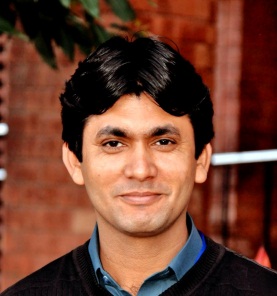Dr. Mushtaque Ali Abbasi

I am a dedicated and hardworking social scientist with a strong passion for teaching and research. With over a decade of experience in these fields, I am enthusiastic about learning new methods and techniques, particularly in modern history, politics, and constitutionalism. I strive to stay updated with the latest advancements in social sciences while fostering a positive and motivating learning environment. I am interested in the research areas of modern history of South Asia, the latest trends in the politics of South Asia, constitutional dynamics, and nationalism in South Asia.
- PhD ,Quaid-e-Azam University Islamabad
- MPhil,Quaid-e-Azam University Islamabad
- MSc,Quaid-e-Azam University Islamabad
- B.A,Shah Abdul Latif University
- F.Sc,Sukkur Board of Intermediate & Secondary Education
- Matric,Sukkur Board of Intermediate & Secondary Education
- HEC Travel Grant Support HEC Travel Grant Support to present a paper in an Annual Conference of British Association of South Asian Studies, Kings College London
- PHEC Travel Grant Suport PHEC Travel Grant Support to present a paper in an Annual Conference of British Association of South Asian Studies, Leeds University, Manchester
- HEC Travel Grant Support HEC Travel Grant Support to present a paper in an Annual Conference of British Association of South Asian Studies, Royal Holloway, University of London
- Member British Association of South Asian Studies
| Student Name | Degree | Title | Status / Completed Year |
|---|---|---|---|
| Arooj Ul Faham | MS | Role of the Federation and Federating Units in Implementing the 18th Constitutional Amendment in Pakistan: Challenges and Prospects The quest for a federal system in Pakistan is pre-partition since Muslim nationalists are striving for their constitutional rights for the Muslims of India. The struggle predominantly took shape after the Lakhnow Pact in 1916 and continued due to the Indian partition into two dominions, India and Pakistan. After partition, adverse relations between Pakistan’s federation and federating units coined the system as a quasi-federalism. Provinces, except Punjab, remained constant in demanding the division of power and authority on the principles of the Lahore Resolution of 1940. However, the political elites at the center were stuck to control power strings by the troika (politicians and civil-military elites). The rift between the Centre and provinces’ over-representation and legislative powers is not only considered one of the causes of the dissolution of the First Constituent Assembly in 1954 and the delay in making the first constitution of Pakistan but also considered a cause of the separation of East Pakistan. The center-provinces crisis did not end with the secession of East Pakistan but rather continued as a majority constraining federalism in a subsequent period. During General Pervaiz Musharraf’s rule, major political parties realized they needed to strengthen democracy through an inclusive federal system in the country. Resultantly, a transition from autocratic to democratic rule in 2008 provided a path to constitutional revolution for devolution of power and an inclusive federal system. The current study seeks to understand, investigate, and examine the role of federation and federating units in implementing the 18th Amendment. The study also analyzes whether the constitutional devolution process is completed or still juggling. The study analytically investigates challenges in the way of implementing the constitutional amendment, if so; it suggests prospects for further betterment in the federal system of Pakistan. Both qualitative and quantitative methods have been applied through the course of study by conducting surveys and interviews as well as analyzing the existing data, respectively. Hypothetically, the study argues that the implementing process is still in process to develop center-province relations and strengthen democracy, evident from the recent fact that political issues are not resolved in the houses of Parliament but rather political parties looking towards the judiciary and the military institution. | Spring-2024 |
-
1. Madiha Abbas, Mushtaque Ali Abbasi, & Ume Raqia “An Analysis of the Role of Judiciary and Judicial Independence in Pakistan” International Journal of Contemporary Issues in social Sciences, June 2024 DOI:
-
2. Mushtaque Ali Abbasi “Orientalist Approach in Historiography” Pakistan Journal of History & Culture (PJHS), May 2024 DOI:
-
3. Mushtaque Ali Abbasi, Sajid Mahmood Awan, Safi Ullah Khan Marwat “Changing Modes of Fiscal Federalism in Pakistan: A Case of Centre-Sindh Fiscal Interplay” Journal of Grassroot, March 2024 DOI:
-
4. Muhstaque Ali Abbasi “State Integrationist Policies in Pakistan: An Analysis of the Impact over Bengal and Sindh (1947-1971)” Journal of the Research Society of Pakistan (JRSP), June 2020 DOI:
-
1. Mushtaque Ali Abbasi “The Eighteenth Constitutional Amendment of 2010: An Analysis of Its Ineffectiveness to Establish Inclusive Federalism ” Annual British Association of South Asian Studies Conference, Kings College London, September 2024 _DOI: September 2024
-
2. Mushtaque Ali Abbasi “Changing Modes of Fiscal Federalism in Pakistan: A Case Study of Centre-Sindh Fiscal Interplay” Annual Conference of British Association of South Asian Studies, April 2023 _DOI:
-
3. Mushtaque Ali Abbasi “The Politics of One Unit in Sindh: An Analysis of Its Effects” Annual Conference of British Association of South Asian Studies, Royal Holloway University of London, April 2014 _DOI: April 014
| Date | Title | Agency/Organization | Amount | Status |
|---|---|---|---|---|
| 2013-04-05 | Centre-Sindh Relations: A Path to One Unit | National Institute of Historical and Cultural Research, Islamabad | 110000 | Completed |
